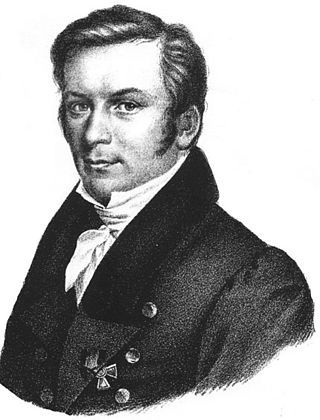
Johann Friedrich Gustav von Eschscholtz was a Baltic German physician, naturalist, and entomologist. He was one of the earliest scientific explorers of the Pacific region, making significant collections of flora and fauna in Alaska, California, and Hawaii.

Pyrophorus is a genus of click beetle. They are one of several genera in the tribe Pyrophorini, all of which are bioluminescent. Their bioluminescence is similar to that of another group of beetles, the fireflies, although click beetles do not flash, but remain constantly glowing. They have two luminescent spots at the posterior corners of the pronotum, and another brighter light organ on the most-anterior surface of the ventral abdomen. This light organ is even brighter and can only be seen when in flight. Bioluminescent click beetles are found throughout tropical, subtropical and temperate America. Species from Texas, Florida, Puerto Rico, and Cuba are now in different genera in the tribe Pyrophorini, such as Deilelater and Ignelater.

Omus is a genus of tiger beetles, subfamily Cicindelinae. Its members are dark colored, nocturnal, and flightless. All members occur along the west coast of North America.
Daniel Rolander was a Swedish biologist and an apostle of Carl Linnaeus.

Eleodes is a genus of darkling beetles, in the family Tenebrionidae. They are endemic to western North America ranging from southern Canada to Mexico with many species found in the Sonoran Desert and Southern California. Some species have been introduced to Colombia. The name pinacate is Mexican Spanish, derived from the Nahuatl (Aztec) name for the insect, pinacatl, which translates as "black beetle."

Buprestinae is a subfamily of beetles in the family Buprestidae, containing the following genera in the tribes Anthaxiini, Buprestini, Chrysobothrini, Melanophilini, and Xenorhipidini:

Chrysochroinae is a subfamily of beetles in the family Buprestidae: the "jewel beetles".

Julodinae is a subfamily of beetles in the family Buprestidae, containing the following genera:

Metrius is a genus of beetles in the family Carabidae, containing the following species:

Eucnemidae, or false click beetles, are a family of elateroid beetles including about 1700 species distributed worldwide.

Metriini is a tribe of ground beetles in the family Carabidae. There are at least three genera and about six described species in Metriini.
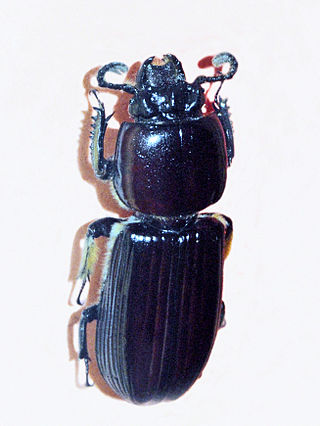
Passalus is a genus of beetles of the family Passalidae.
Cicindela altaica is a species of tiger beetle in the genus Cicindela. It was described by Eschscholtz in 1829 and is endemic to Altai Mountains in Russia.
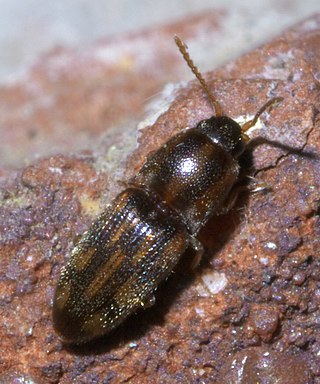
Monocrepidius is a genus of click beetles in the family Elateridae. The genus has often been cited as Conoderus, but of the two names for this genus published simultaneously in 1829, the one selected by the First Reviser under the ICZN was Monocrepidius, rendering Conoderus the junior synonym.

Dicercini is a tribe of metallic wood-boring beetles in the family Buprestidae. There are more than 30 genera and over 750 described species in Dicercini.

Elaterinae is a subfamily of click beetles in the family Elateridae, containing 12 tribes worldwide.
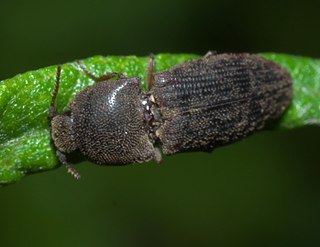
Agrypninae is a subfamily of click beetles in the family Elateridae. There are at least 130 genera and more than 430 described species in Agrypninae.
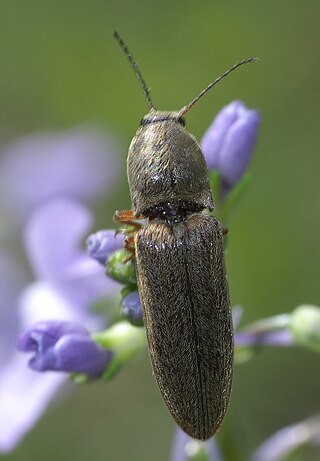
Dendrometrinae is a very large subfamily of click beetles in the family Elateridae, containing 10 tribes worldwide, including several formerly recognized subfamily-rank groups such as Athoinae, Crepidomeninae, Denticollinae, Oxynopterinae, Prosterninae, and Semiotinae now all reduced to tribal rank or lower.
The Oophorini form an accepted taxonomic tribe within the Elateridae subfamily Agrypninae.
















